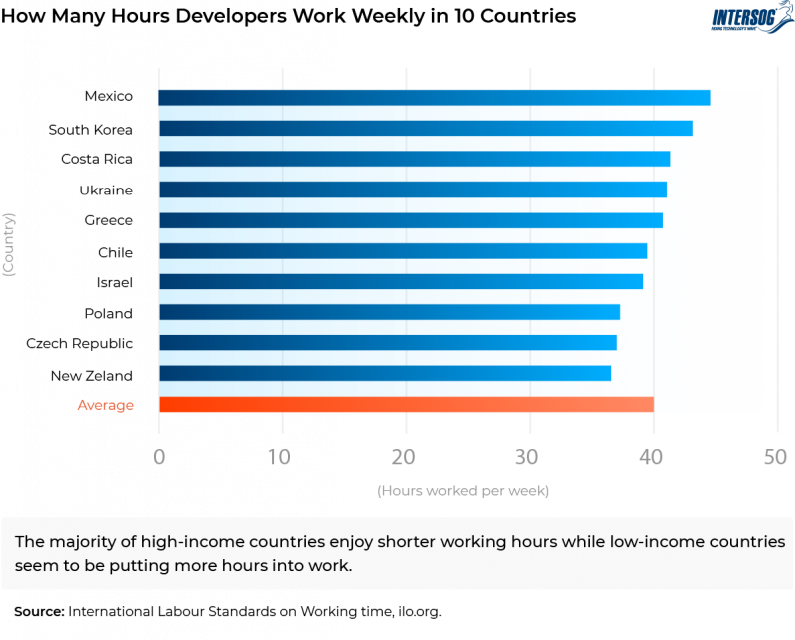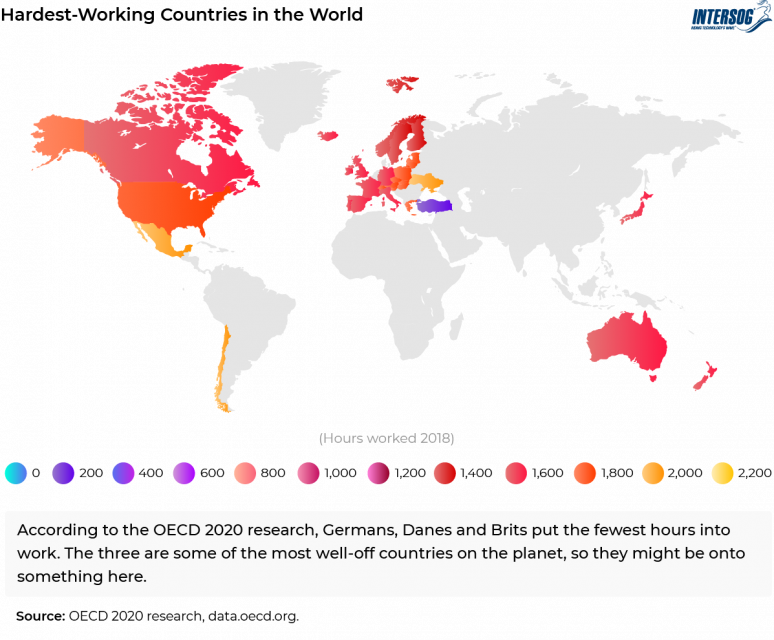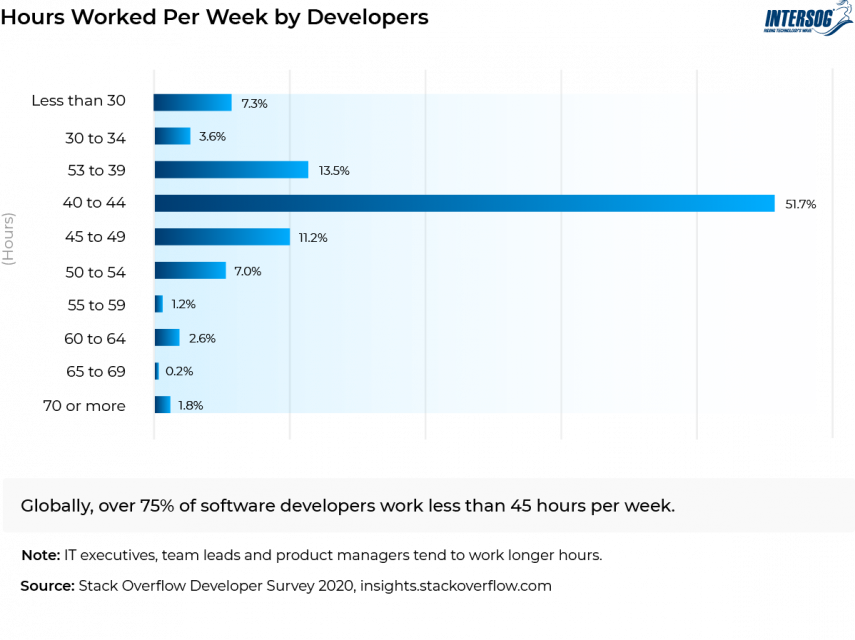If you are new to software development or want to hire developers for your next project, you might wonder how many hours do software developers work a day. Well, it really depends, and today, we are going to take a look at how much time the developers spend working on their projects.
There are lots of misconceptions around the developer’s workload both inside and outside the industry. Some people think that developers work all the time.
There’s this stereotype of a geeky developer who spends most of their waking hours by the laptop often forgetting to eat or shower. Well, there might be some people out there working like 60 to 80 hours a week but generally speaking, this is a gross exaggeration.
Some people would even go so far as to say that the developers do nothing all day long. Apparently, sitting by the computer is not real work to some people.
Whatever your opinion is, the truth is somewhere in the middle. We are going to look at some factual data on the average software developer work hours to find out exactly how much work they put into their projects.
What Labor Laws Say

There are laws regulating the number of working hours a week for employees of different types in different industries. These norms might fluctuate from country to country, the average number of working hours per week in most countries ranges somewhere around 35 to 45 as per International Labour Standards on Working Time. The majority of high-income countries enjoy shorter working hours while low-income countries seem to be putting more hours into work.
So, do software developers work long hours? Well, that depends on a whole bunch of factors, so let’s take a closer look.
Cultural Differences
Some nations are famous for their persistence and the hard work they put into anything they do.
As an instance, Japanese are known for their readiness to work extra hours, often unpaid, to the point of working up to 80 hours of overtime a month. Well, that is not healthy, to say the least, and the Japanese even coined the macabre term “karoshi”, which literally means “death by overwork”.
Surely, nobody wants their developers to die from working too much, but you can tell some nations are willing to put in more hours to get the job done.

There are countries on the opposite side of the spectrum that seem to be working fewer hours. According to the OECD 2020 research, Germans put the fewest hours into work with an average of 27,7 h/w, followed by Danes who work 28 h/w, and Brits who work 28,4 h/w. At the same time, the three are some of the most well-off countries on the planet, so they might be on to something here.
Type of Company and Service
According to the StackOverflow study, about 51% of developers work around 40 to 44 hours a week. Around 13 percent work just under 40 h/w, and some work as few as 30 h/w. Of course, there’s a small percentage of people who work much more than that. It all depends on the type of work they do and the type of company they work for.
So, we’ve established that most developers work somewhere around 40 hours per week, which corresponds to the labor laws in different countries. However, this might also change depending on what kind of service the developers provide. Web developers might work fewer hours than say video game developer would, simply because their workload is not that high.

Most types of developers have a stable workload – they work on their tasks and have certain milestones to achieve, and they move from one milestone to another at a stable pace. That is how software developer average work hours stay the same for months and years on. There also are developers whose workload is less stable.
For instance, if the developer works in a supporting role and is responsible for fixing bugs whenever they occur, they might have several days of crazy productivity working 10 or more hours a day and then have a couple of relaxing weeks while everything is going smoothly.
Different companies have a different attitude to overworking their employees, some pay overtime, some don’t. Some encourage self-management and allow their employees to work whatever hours they want as long as the job is done; the others have strict 9 to 5 schedules.
The Actual Work
Let’s face it, the 9 to 5 schedule does not mean people actually work all that time. Unless you are standing over each employee’s shoulder all day long, everybody is going to have a coffee or smoke break once in a while, chat with the colleagues at the office kitchen, watch some videos on YouTube, and whatnot.
The working hours for software developers, especially the ones working remotely, are not set in stone. They might spend an hour or two doing their actual job and then spend an hour tending to their own stuff, and then get back to work. What matters here is getting the job done on time. People are not machines, they cannot work 9 to 5 without distractions or having a couple of minutes to stretch their bones from sitting for hours on end.
According to the World Health Organization statistics, engaging in insufficient activity is rather common among people around the world. The WHO data shows that the most active countries in terms of sufficient working time are the US, Finland, Sweden, and Switzerland.
Despite they are high-income countries where people tend to work fewer hours on average, the hours they do spend at work mostly are actual working hours.
So, if you hire software engineers in any of the high-sufficiency countries, you can be certain you are paying for the actual work rather than the hours.
Tips for Efficient Working Hours
Let’s get this straight out of the way – your employees are not robots – they will have coffee breaks, they will slack here and there, and they won’t be working the exact number of hours you put on their schedules. How do you make each hour of their sufficient work count? Well, let’s say the average web developer work hours would amount to 40 h/w, of which 8 would be spent insufficiently – that’s a full day of work. How do you compensate for that?
Reduce Tiring Meetings
How many hours do you spend on meetings every week? No matter the answer, you can surely cut some of that out. Do not tire your employees with redundant calls just to check on them. Only schedule meetings when they are absolutely necessary. Spending a full hour listening to someone else’s progress reports is not a productive way to start off a day.
Effective Communication
This leads us to the next point – make sure all the communication happens swiftly and effectively. Do not make a long discussion off of a single email topic. Starting a day with a long and tiresome call from a manager sets the mood for the whole day. If you can convey your meaning with a single message, just do that and write that message instead of calling and distracting people over and over.
Avoid Multitasking
Some people thrive in chaos and handle multiple tasks at the same time quite efficiently. Most people, though, work more effectively when they have a single clear objective in front of them. You want to assign clear and comprehensive tasks to each employee and give them all the tools they need to finish that task in a timely manner.
Sense of Urgency
Set realistic deadlines for all the members of the team. Make sure to give them challenging yet comfortable deadlines so that they wouldn’t be running around in panic but rather work steadily and dedicate most of their time to finishing their tasks when they are due.
Final Thoughts
We’ve established that most developers work around 40 hours a week, but there are certain caveats here. The game developer work hours would be different from, say, QA expert’s work hours, and that is totally normal. Some types of developers work steadily over a long period of time, some have bursts of productivity followed by periods of low activity. All of that is totally normal, and you need to understand the peculiarities of working with people.
Just because you work hard, does not mean everybody else does. People love to slack, they always find ways to work less, and that is totally fine. What you need to do is find that balance between having a good time at work and actually doing the work. The goal here is not to make people work more hours but to make those hours count. You have an average of 40 working hours per week, of which roughly 32 are active hours, so you have to make those 32 hours of actual work as efficient and as beneficial to your business as possible.






